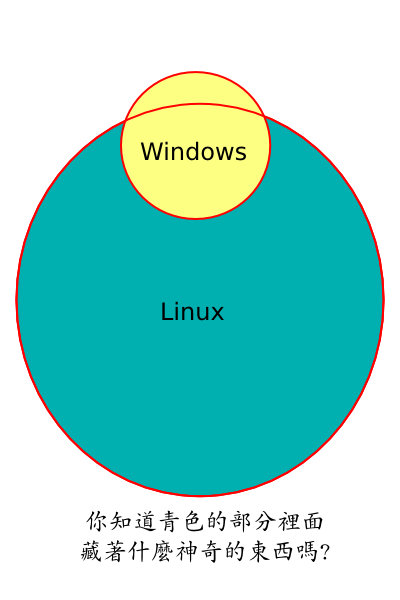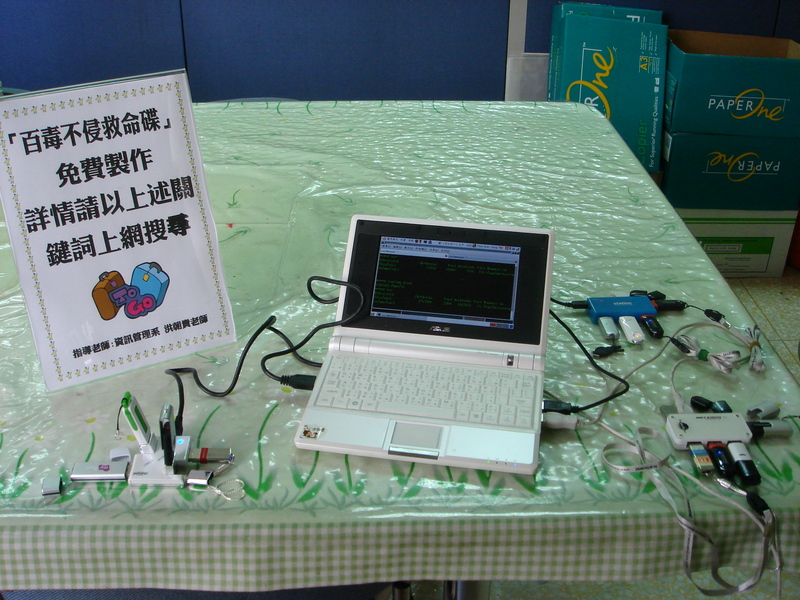An Advocacy Story: Cloning Bootable USB Sticks for the Audience
By HUNG Chao-Kuei on Wednesday, July 23 2008, 18:16 - Permalink
Here is a suggestion for fellow FLOSS advocates, especially for those who often give FLOSS speeches like me. First offer to create bootable usb sticks for the audience. Then try to make a press release. Finally let your speeches become one of the popular search targets.
* * * * *
I have submitted this article to linuxtoday. Later it appeared elsewhere such as unixforum of uk and is slightly digged :-)
* * * * *
 I gave
many FLOSS speeches in my country, Tainwan,
as well as a small number in other countries/areas including
France, Macao, and Indonesia. One of my FLOSS advocacy
strategies is the "difference strategy": emphasize what FLOSS
can easily do that proprietary software cannot (instead of
giving arguments like "OO.o can also do such and such that MS
Office can do). That is the mathematical set difference L-W
in the picture. BTW OO.o and other similar FS projects are great
and we dearly need them to shrink the other mathematical
set difference. (W-L in the picture) It's just that it's not
the best strategy to always take the defensive position and
emphasize the intersection part (W^L in the picture)
when advocating. Ordinary audience, by nature of
their computer usage practice, typically unreasonably
exaggerate W-L while they are unable to imagine anything
exists in L-W if we don't show something to them.
I gave
many FLOSS speeches in my country, Tainwan,
as well as a small number in other countries/areas including
France, Macao, and Indonesia. One of my FLOSS advocacy
strategies is the "difference strategy": emphasize what FLOSS
can easily do that proprietary software cannot (instead of
giving arguments like "OO.o can also do such and such that MS
Office can do). That is the mathematical set difference L-W
in the picture. BTW OO.o and other similar FS projects are great
and we dearly need them to shrink the other mathematical
set difference. (W-L in the picture) It's just that it's not
the best strategy to always take the defensive position and
emphasize the intersection part (W^L in the picture)
when advocating. Ordinary audience, by nature of
their computer usage practice, typically unreasonably
exaggerate W-L while they are unable to imagine anything
exists in L-W if we don't show something to them.
So a few months ago I started writing a perl script mk-boot-usb that slightly simplifies creating bootable usb sticks and greatly simplifies cloning usb sticks it creates. Putting an entire OS plus many apps on a usb stick is certainly not a technical challenge for Microsoft, but it's something that Microsoft would hate to do. They will simply refuse to compete on this front unless they drastically change their business strategy or even business model. This can be a nice example of the "difference strategy".
After that, I started making arrangement before giving a speech, whether it is technical or not, so that:
- The speech organizer inform the audience to bring blank usb sticks, and give them search keywords that will find a non-technical article (let's call it X) I wrote about what such a bootable usb stick is about.
- There be a few computers that can boot from usb stick or at least can boot from cdrom.
- A student of mine be hired to do the cloning work on the spot on that day.
My website enjoys some popularity, and my target audience is restricted to Traditional Chinese readers, so devising search keywords for article X is not too difficult. Remember to try your alternatives on the search engines and pick the least popular one. I suppose putting yourself in non-techincal peoples' shoes would also help. My keywords did not contain "Linux" or "free software" or even "bootable". It is "百毒不侵救命碟", meaning "virus-free computer saver". That may catch an ordinary Windows user's attention better than any of the above. Then there is a link from article X to my google calendar, where I mark my upcoming speeches for which I offer this free (gratis) service to my audience. Finally there are also links in article X to two companies that sell bootable linux usb sticks (though different from mine). The owners of the companies are my friends, but I offer to link to any FLOSS-friendly company that sell such products and/or services.
I began to offer this service even when I was not involved with a speech/activity, and even when the activity has nothing to do with FLOSS, beginning in my University. Then one day a colleague at my university in charge of public relations noticed my activities and asked me to write a short press release about what I was doing with FLOSS. In the following weeks, this news appeared in several medias. Untargeted audience began to appear in my speeches and the keywords became recognized by google and yahoo :-)

I offered to do this for my colleagues at my university when the summer vacation began. 60 or so sticks arrived and because of some mistake I got the opportunity to do the cloning work myself this past weekend. The image of an eeepc cloning linux distributions from one stick to 11 others is just so inspiring that I feel obliged to share it with you all :-) It's still doing it serially and possibly insufficient currents made some of these unsuccessful (which became bootable on second try with fewer neighbors). Nonetheless it freed me from attending to the machine every 10 or 20 minutes, a repetitive task that could have been scripted if I had paid more attention to my students' tedious work.
I strongly believe that spreading GNU/Linux on usb sticks is a highly effective advocacy strategy. For example, it renders the debate about which OS to pre-install pointless if hardware vendors can be persuaded to sell diskless computers. As another example, InstallFest can be much lighter now: participants don't need to bring their notebook computers, and they don't have to spend time learning the "technical details" of the (scary!) 7 steps required to install Ubuntu. They can bring their usb sticks and hand them over to the organizer, and have a chat or watch app demos while their usb sticks are being cloned with one single command. I will discuss the higher level advocacy strategy in another article. For now, let's work in each of our own countries with each of our own languages to bring the awareness [of what FLOSS can do that proprietary software cannot] to our countrymen.
But be warned: it's also highly addictive to do this cloning work for people. I would really buy 12 more usb hubs and ask every class of my students to hand over 47 usb sticks that I can clone in one shot for them if current shortage was not a problem...
![[rss feed 圖案]](/~ckhung/i/rss.png)
Comments
Currently I subscribe to PendriveLinux.com, which is a site that instructs user on installing diverse OS's on usb media. As for the advocacy, I'd like to hear (read) more, since I'm currently in the process of demonstrating & converting a few folks over here in a not so small American town to the "Linux experience". Will try your scripts to see how that works out. I do it on a smaller basis (1 or 2 people a day), but the reaction has been very positive.
Hi p.cole, nice to know what you are doing. Many distributions have scripts that create bootable usb sticks under windows (I suppose the one you use has). This is an advantage over my mk-boot-usb. On the other hand, mk-boot-usb is not tied to a single distro, and the stick it creates has the ability to clone itself.
As for advocacy, my next step is to promote diskless computers. I just finished an article: Public Computers: Diskless and Trouble-free. It emphasizes the benefits of being free from viruses and illegal download [of software/music/movies/...] if public computers don't have harddisks. The next step is to persuade hardware manufacturers to sell such computers, which I shall do in the next few weeks. I have many related ideas under the tag 隨身碟開機. Unfortunately I write mostly in Traditional Chinese. I will summarize in English and give these articles the tag usb boot when I have some more success stories to report.
Anyway, you might try to begin by offering your bootable-usb-making service to your classmates or colleagues. You can attract attention by systematically enlarging the circle of influence. At each level, it is probably better to have a clearly defined group of audience (such as class/school/town/...) Happy advocating!
I have prepared an usb key with your script, it work great. Now I also want to install an useful system into it.
Could you give the details to get SAX running on a usb key prepared with your tool?
It helps. Note that when I prepared the key with your script I got by default Vfat partition for the second one, even without prefixing with a minus '-'. To get an ext partition, I asked for partitions: 0 223.
May I recommend that you advocate Portable Linux?
http://rudd-o.com/new-projects/port...
This post's comments feed